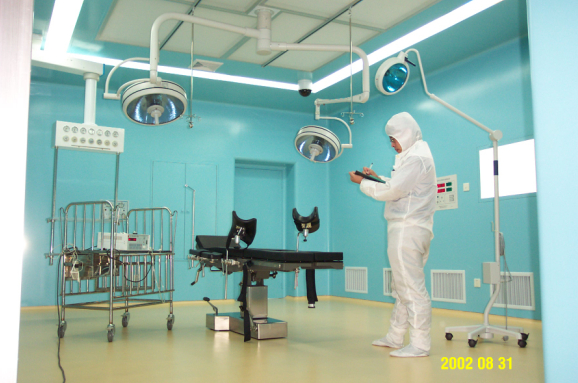
Because of the various demands made by specialized procedures, healthcare facilities, have many areas where filtration must be of the highest efficiency. This usually includes operating theaters, outpatient surgery suites, labor and delivery, bone marrow transplant, isolation rooms, critical care, intensive care, and several other area designations as well. The High Efficiency Particulate Air (HEPA) filter provides the best protection from infection and contamina tion from airborne microorganisms, especially when engineered so that the filter is mounted at the terminal of the duct, commonly referred to as ceiling mounted HEPA filters or modules. These filters have a long history of providing protection against airborne diseases. Currently, there is no ordinance or federal regulation, or even a mandate to have them installed in hospital operating rooms. The American Society of Heating, Refrigerating and Air Conditioning Engineers (ASHRAE), the American Institute of Architects (AIA), and the Joint Commission for the Accreditation of Healthcare Organizations (JCAHO) all recommend HEPA filtration. Klair serves as an accreditation organization to monitor hospitals and medical care facilities and requires hospitals to design, install, and maintain ventilation equipment to appropriate pressure relationships, air exchange rates, and filtration efficiencies for ventilation systems areas specially designed to control airborne contaminants. Such contaminants may include biological agents, gases, fumes, and dust particles. These specially designed areas include; Special Procedure rooms, Delivery Rooms with patients diagnosed or suspected of having airborne communicable diseases such as TI5, patients in protective environment rooms, those with immunodeficiency conditions, or bone marrow transplant patients. Also included are laboratories, pharmacies, and sterile supply rooms. (1) Most healthcare facilities that do utilize HEPA filtration in critical care areas apply this technology because they understand the value in terms of reducing the number of nosocomial (Hospital acquired) infections. The CDC estimates that over 90,000 people die each year from nosocomial illness. They also state that over 50% of these cases are preventable. This can be accomplished by utilizing high quality HEPA filters in the air distribution system. In fact, ASHRAE: recommends MERV 17 or 99.97% HEPA filters at the outlet of Orthopedic, Bone Marrow Transplant, and Organ Transplant Operating Rooms. (2) (1) Hospital Accreditation Standards; 2004 Environment of Care 7.10 -No. 15
(2) ASHRAE Handbook 2003 Health Care. Facilities 7.3 Table 1 Transmission of diseases by the airborne route is usually done by droplet nuclei, small droplets of moisture, or dust particles in the size range of 1 to 5 micrometers. These small particles can stay suspended in the air for long periods of time. Small microorganisms and viruses usually “ride” on these particles that can affect open wounds or are breathed into the deep lung section where they can cause potential disease and infection. Although the sources of these contaminants are many, people are the biggest carrier of contaminants requiring extensive covering of operating room personnel with clean garments to prevent contamination. Poorly maintained HVAC units are also responsible for unwanted contaminants entering a room via the HVAC distribution system. Therefore, the terminal HEPA filter is the popular choice to provide maximum filtration from any airborne contaminant that might enter the HVAC unit or ductwork downstream of in-line unit-mounted HEPA filters. Ceiling mounted HEPA modules deliver clean, filtered air in a flow to the room that provide a sweeping effect that pushes contaminants out via the return grilles that are usually mounted on the lower wall. While there is no true unidirectional airflow, this top to bottom flow closely duplicates a “piston-effect.” With ceiling mounted HEPA units, the air is as close to unidirectional flow in operating rooms as is feasible, based on the various types of equipment and instruments that typically interrupt unidirectional airflow patterns.
|